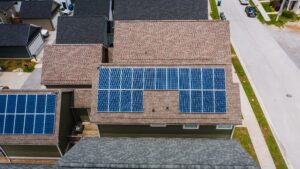
Are you considering making the switch to solar energy or already have panels installed? There are numerous reasons why going solar makes financial and environmental sense for your household.
One of the greatest advantages is that you no longer rely on your utility company for electricity supply. Not only that, but you can reduce your energy bills and even become self-sufficient by using storage for backup power sources.
Reduction in Electricity Bills
Solar systems are an effective way to reduce your electricity bills. On average, American families save up to $1,413 annually on their electric bill with solar power.
Before going solar, there are a few things to consider. Most importantly, make sure your meter readings are accurate and that you aren’t overusing power.
If your energy usage is excessive, you can try to reduce it with simple changes to your daily schedule or home automation devices. Alternatively, solar batteries can store excess electricity so that it’s available when needed.
Net metering systems enable any excess power generated by your solar panels to be fed back into the grid in exchange for credits on your monthly electric bill. You may use these credits during peak usage times or when there’s more solar capacity than needed, which can further reduce costs by decreasing usage requirements.
Reduced Maintenance Costs
Solar energy systems require little upkeep over their 30-plus year lifespan, as there are only a few moving parts and materials used that are designed for durability in all kinds of weather conditions.
Solar systems rarely malfunction unless they have bad parts or have been damaged due to weather damage. Furthermore, many come with extended warranties ranging from 20-25 years.
The cost of going solar for your home is determined by several factors, including how much sunlight your house receives and local electricity rates. The number of panels needed and whether they are mounted on your roof or ground also have an effect on pricing.
Solar power systems are experiencing cost savings due to modern technologies and plant designs, as well as inverter gains, remote monitoring capabilities and enhanced cleaning strategies.
Future-Proofing Your Energy Supply
Solar panels are not only an economical way to save on your energy bills, but they also offer you peace of mind. By going solar, you can guarantee that your family won’t be caught unawares by rising energy prices.
The future of energy consumption is ever evolving, particularly with the growing popularity of electric vehicles (EVs). Furthermore, the shift away from fuel-based heating to air source heat pumps could result in higher electric usage as a result.
Thus, when planning for solar panel installation, it’s essential to account for potential changes in your electricity consumption habits.
Thankfully, the cost of installing solar panels has significantly declined over the years, making going solar more accessible than ever before. Right now you can get up to EUR2,400 in grant funding – making now an excellent time to take advantage of this offer and protect your family from energy price rises and future climate change impacts. This is an excellent opportunity to go green while staying within budget – plus it helps offset some environmental impact too!
Affordability
When it comes to solar energy costs, several factors will influence your final price. These include how many panels you require, your home’s size and exposure to sun.
Installing a solar system at home can significantly boost the value of your property, and you may even recoup some of your upfront costs over time. The length of payback depends on several factors such as energy usage and electricity rates.
Depending on your financial situation, you may be able to finance the cost of your solar installation through either cash purchase or loan. If you do not have enough funds for a full purchase of a system, lease or power purchase agreement (PPA) are other viable options which offer lower upfront costs but require you to lease or buy panels instead. However, please keep in mind that with these options, tax incentives and rebates cannot be taken advantage of.